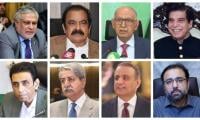Notwithstanding what Shakespeare says about Ides of March as well as tragic year of 1971 when in the same month Sheikh Mujibur Rehman decided to formally go for Bangladesh despite inevitable army operation to stop him, it has equally important historic significance on two other counts.
On March 23, 1940 Lahore Resolution was adopted by a representative gathering of Muslims of the sub-continent under the banner of All India Muslim League setting ultimate goal for the creation of Pakistan under the dynamic leadership of Quaid-i-Azam Mohammad Ali Jinnah (MAJ). Seven years later Pakistan came into being despite fierce triangular opposition by the British rulers, Indian National Congress and Muslim religious leaders.
Interestingly enough the Resolution was moved by Sher-i-Bangla Maulvi Fazlul Haq from Muslim majority Bengal province and seconded by Muslim minority province of UP by Choudhry Khaliquzzaman in a city that until then had been a stronghold of pro-British Unionists mostly feudal Muslims of Punjab. Interestingly on March 23, 1929 was born Begum Nusrat Bhutto who later emerged as the torch bearer and fighter for Quaid’s vision of a democratic Pakistan, empowerment of the people including women and minorities.
Regretfully mission objectives got derailed soon after the death of the Quaid and his trusted lieutenant Liaquat Ali Khan. First, MAJ’s vision was hijacked, his dream of Pakistan as a secular social welfare state with ironclad guarantees for equal rights for all its citizen--irrespective of caste, creed, colour or gender were replaced by the concept of a security state for the greatest good of the power troika comprising of establishment, judiciary and bureaucracy backed by Punjab’s feudal class and those very religious parties that had opposed creation of Pakistan.
It is indeed a tragedy of the highest magnitude that in MAJ’s Pakistan today attempts are being made by the vested interests to deny women their rightful place and equal status as seen in the ugly manifestation of an abortive attempt by a provincial minister to impose Hijab on girls in Punjab. Similarly, important institutions such as local bodies—the grassroots of democracy—have the audacity to publicly advertise jobs of sweepers only to be applied by minorities such as Hindus, Christians and Shias. Till the writing of this piece Bannu Local Body run by JUIF had not withdrawn its most humiliating advertisement.
Pakistan’s history without three women being mentioned as catalyst would remain incomplete. First was Madar-e-Millat Mohtarma Fatima Jinnah—sister of founder of the state Quaid-i-Azam MAJ. Hers was a life devoted to the well-being of her iconic brother who was consigned by Providence to create history single-handedly leading an essentially peaceful democratic struggle to establish a state for his nation by vote—in which religion shall have noting to do with the business of the state.
Despite having not much to do with practical politics; Mohtarma Fatima Jinnah had learnt her bit of politics from the close company of one of the greatest leaders of all times. She knew the pristine values that were dearest to her upright brother and what was to be good for Pakistan. She believed that her brother had rightly chosen a democratic, secular and progressive future for his country. And when she realised that President Ayub Khan was subverting her brother’s vision despite her frail health and bearing she accepted to be Presidential candidate of the Combined Opposition Parties (COP) and decided to challenge the military dictator. Had she not tried to grapple bull by the horn, course of Pakistan’s history would not have changed after 1965 war.
Twelve years later yet another fragile woman—Begum Nusrat Bhutto-- with strong nerves was entrusted with the responsibility of leadership to defy dictatorship. Zulfikar Ali Bhutto had established a populist, left of the Centre political party—the Pakistan People’s Party-- opposed to forces of status quo-- to harness dynamics of socio-economic and political change that he had ushered in --to defy country’s worst possible and history’s most ruthless military dictator General Ziaul Haq.
While ZAB had been arrested on trumped up murder charge, the woman who was putting up resistance to the ruthless dictator was not as per her stars an ordinary person. It was no small coincidence that her date of birth was March 23 in the year 1929. Eleven years later Lahore Resolution was adopted on March 23 in 1940. Indeed, destiny had chosen a role for Nusrat Khanum as well. On yet another grim reminder and national tragedy of most humiliating surrender, she was baton charged by Zia hounds in a cricket Test match on December 16, 1977 in Ghaddafi Stadium—when the milling crowd seeing her went into a resounding crescendo of slogans—“Bhutto Zindabad.” It was this head injury that later incapacitated her, became cause for Alzheimer’s and loss of memory.
General Zia was not content by spilling her blood only. She was arrested in hospital when her deep head wound was being stitched. She was forcibly dragged away by the police. On great public protest she was shifted to her house and held in isolation for 21 months while Bhutto Sahib’s appeal against his conviction continued. And finally four Supreme Court judges obeyed General Ziaul Haq, upheld his conviction while three judges acquitted him. This outrageously dubious decision of the Supreme Court was declared by international jurists as judicial murder of an innocent man.
This is not just a memorial article to pay tribute to Begum Bhutto. Rather, it is an overall tribute to Pakistani women who are standing aloft in various fields of human endeavour despite heavy odds in an essentially man’s world now falling speedily under the influence of retrogressive religious forces. Begum Bhutto kept ignited the populist aspirations of her husband and his devoted followers by defiance to the dictator alone supported by womenfolk. Initially she was alone but later Bhutto Sahib’s “Dearest Daughter” Benazir Bhutto joined her. Both served as the catalyst that transformed their peaceful efforts into ultimate return of democracy in 2008.
While referring to Begum Nusrat Bhutto’s contribution towards galvanising opposition parties under the banner of MRD to take on dictatorship and also Benazir Bhutto’s unparalleled sacrifices culminating in her assassination by the retrogressive elements who acted as killer puppets on the chains of a dictator who had been their mentor— democracy that we have today needs to be preserved at all cost as a tribute to all those who singed the path to it with their blood.
On Pakistan Day our political leaders must search their hearts. Regretfully, growing corruption, lack of good governance, failure to give equal rights and respect to women and minorities—amounts to giving space to extra constitutional forces and the retrogressive elements romping in the country under the cover of religion. One would say with a heavy heart that our country on account of various factors starting from the threat of cyber laws to silence dissent, recent example of disappearance of human rights bloggers, war of invectives launched on social media against bravest among woman leaders today Advocate Asma Jehangir at the behest of forces seeking Talibanisation of Pakistan, support from within the government to perpetrators of terrorism, extremism and sectarianism and carte blanche to some of the Jihadi terrorist organisations to carry their pogroms against minorities—has converted Quaid’s Pakistan into a state of fear.
Lately Prime Minister Nawaz Sharif is quoting from MAJ’s August 11, 1947 speech in the Mother Legislative Assembly. It is indeed music to our ears when he says all citizens in Pakistan have equal rights and that there shall be no discrimination against any one on grounds of caste, creed, colour or gender. He visits to Hindu enclaves in Sindh to join in Diwali and Holi’s colourful celebrations are no doubt reassuring steps but when seen in the larger national scenario, they look more cosmetic than meaningful.
It will not be Orange train, Metro, CPEC or motor way that will keep his name alive since all these projects whatever their intrinsic advantages are collaterally marred in the filth of corruption. If he really wants to be remembered in history in letters of gold, he should bring about an amendment in the Constitution replacing Objective Resolution with Quaid’s speech of August 11, 1947 as its Preamble. After all, on that day, the Quaid laid bare the blue print of his vision of Pakistan.
Objective Resolution was an afterthought forced into acceptance by those elements within the government headed by Chouhdri Muhamnmad Ali who had dared to censor MAJ’s speech of August 11, 1947.
I am sure except those parties whose forefathers had opposed MAJ and establishment of Pakistan before partition, rest of them would support incorporation of MAJ’s historic speech of August 11, 1947 as Preamble to the Constitution. This would be MNS’ infinite contribution to Pakistan carving for him a unique niche in hall of fame.
Author is former High Commissioner of Pakistan to UK, a veteran journalist and long-time advisor to Prime Minister Benazir Bhutto.
Email: wshwsh786@gmail.com
A general view of Islamabad city can be seen in this picture released on January 5, 2023. —...
People buy fish at the G-9 weekly bazaar in the federal capital as demand rises despite high white meat prices during...
Islamabad Capital Territory Police stand guard on the road of Islamabad. — AFP/FileOver the past decades,...
A group photo from the USAID’s Higher Education System Strengthening Activity's impactful four-day training on...
The picture shows Islamabad police personnel in this undated photo. — AFP/FileIslamabad : The capital city of...
Prof Ayaz Qureshi from University of Edinburgh,UK addressing an event.— Facebook@iubwp/File Islamabad : Prof Ayaz...







